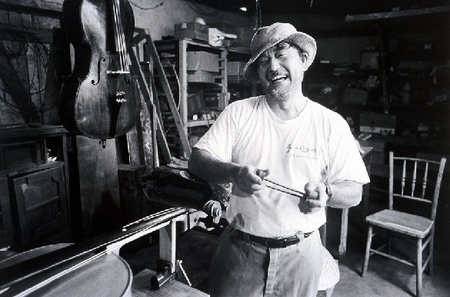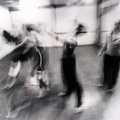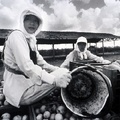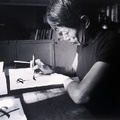In 1990 I made my first trip to Community Yuba pregnant with hope. The offshoot of Yuba’s legacy had propagated and germinated abroad and we had returned to celebrate a birth. While caring for my newborn son, I felt the artistic impulse in every corner of the community. Pottery, sculpture, painting, theater and music permeated the daily rhythm. I was drawn to poetry and attended an evening haiku gathering. Young and old gathered around the communal kitchen tables to pencil poems on small strips of paper. Final judging was informal and calculated with a vote of raised hands. After light refreshments the old retired for the evening while the young ran off to play in the last hours before bedtime.
Tucked away with the pioneers’ bedding and rice pots was a space reserved for literary baggage. Sheltered in their own linguistic haven, people of Yuba continue to use Japanese as their primary language. People, who would not commonly think of themselves as poets or writers, are able to sketch fleeting images of daily life. In an unpretentious style of verse known as haiku, they are gifted with an ability to intensely capture the essence of this place I have come to know as Yama.
農場の もちつき音に 目がさめるon the farm
the sound of pounding mochi
awakens meMai Kumamoto (“Maichan” b. 1983 age 14)
大鍋の 雑煮に 並ぶ五十人
around the enormous pot
of new year’s soup
fifty people
Hana Yuba (“Hanachan” b. 1921)
初シネマ 忠臣蔵と 決まりけり
it’s decided
the first cinema showing of the year
“Tale of the Loyal Forty-Seven Retainers”“Guransha” Minowa (“Kinchan” 1909-2003, written 1957)
風そよぐ 読書の大樹 マンガ落つ
the wind rustles down
upon a reader beneath a large tree
plop - a mango dropsHide Hirose (visitor)
水飲めば 汗が吹き出す ゴヤバとり
taking a sip of water
the sweat scatters
picking guavaKanna Yuba ( “Agu” b. 1980 age 13)
雷に 皆走りゆく 物干し場
amidst the thunder
everyone running
to the laundry lineRaori Yuba (“Pojin” b. 1958)
百合捜して ピアノも生活 必需品か
hunting for lilies
is the piano, too,
a life necessity?“Guransha” Minowa (“Kinchan” 1909-2003, written1960)
百人の 食卓ならぶ 柿の色
on meal tables for a hundred
sitting in a row
the color of persimmonsAki Yuba (“Ayachan” b. 1925)
焚火祭 おどってわらう 山の人
torchlight festival
dancing and laughing
people of YamaRan Yuba (“Enchi” b. 1986)
冬の風呂 脱衣の棚を 満杯に
winter bathhouse
all the shelves taken
with bathers’ clothesHana Yuba (“Hanachan” b. 1921)
天の川 出稼ぎの父 待つ家族
across the Milky Way
father seeks work in Japan
pining family waitsAki Yuba (“Ayachan” b. 1925)
子供たち 春の雨の中 どろあそび
children
caught in the spring rain
wallow in the mudKanna Yuba (“Agu” b. 1980 age 12)
舞台稽古の 汗に雨来る 気配あり
stage rehearsal
sweating reminds me of
approaching rainRaori Yuba (“Pojin” b. 1958)
クリスマス すんでみんなの 俳句会
Christmas
it is over and all
gather to write haikuKanna Yuba (“Agu” b. 1980 age 19)
* View the Yama Project photo album >>
© 2004 Janet Ikeda






